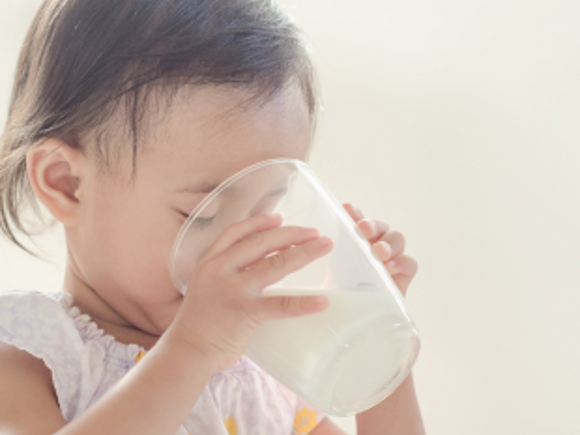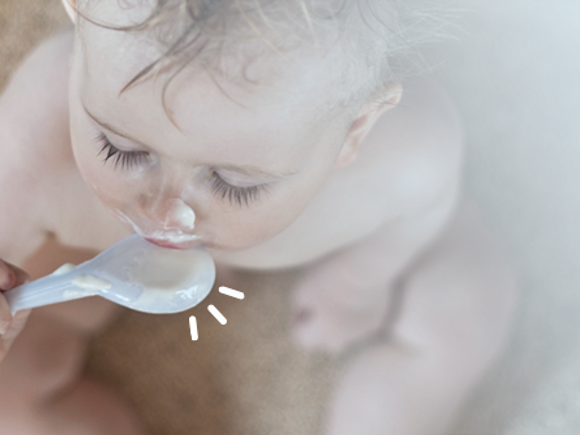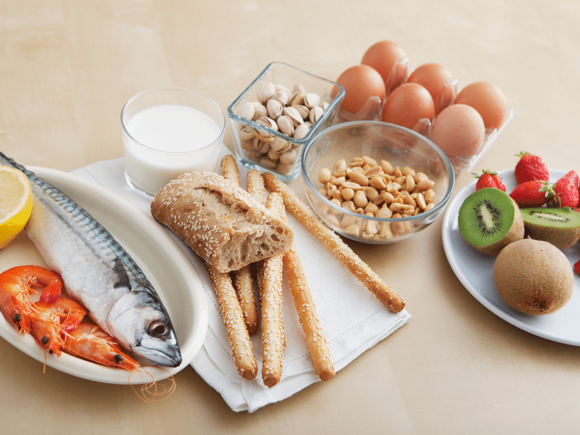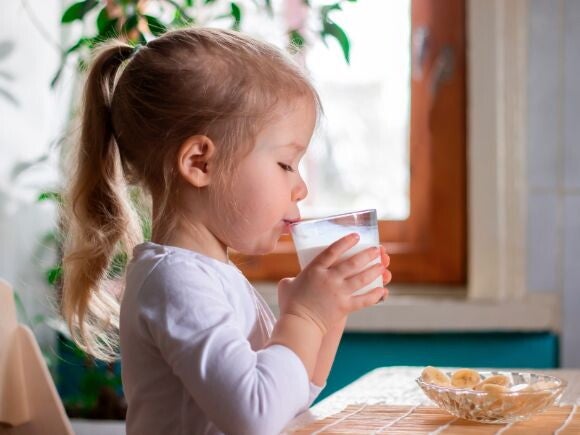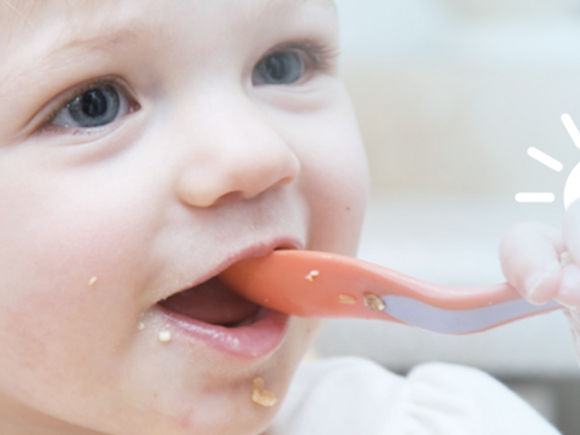When can babies drink cow’s milk?
Cow’s milk should not be a drink for babies under 12 months of age. Breastmilk or infant formula provides all the essential nutrients needed for growth and development until around 6 months of age. Until this time no other foods, including cow’s milk are recommended.
Once solid food is introduced at around 6 months of age, breastmilk or infant formula should continue to be the main source of nutrition up until 12 months of age. From 12 months of age, you can start offering cow’s milk to drink as part of a varied diet, or a cow’s milk-based toddler milk drink when energy and nutrient intakes may not be adequate.
How do I start transitioning from infant formula to drinking cow's milk?
You may wish to start transitioning from infant formula to cow’s milk after your baby has turned 12 months old. By one year of age, your toddler should already have been introduced to a variety of new foods, tastes and textures and be progressing toward the family diet. So, changes at this age from their usual infant formula to cow’s milk should be tolerated quite well.
You may find however your toddler better adapts to changes in feeding when they are introduced gradually. For example, alternating between the old and new feeds may ease the transition. You may also try starting the transition in the morning — that way if any intolerance occurs, you can observe them during the day.
In addition to adapting to new tastes and ensuring tolerance, transitioning from infant formula to cow’s milk also means transitioning from bottle feeding to drinking out of a cup if this hasn’t already happened. The same principles apply and alternating between cup and bottle at the start will help. For example, you can try offering a sippy cup during the day but keep the bottle for before bedtime as a comforting feed to ease the transition.
When can babies drink cow’s milk instead of baby formula?
Breastmilk or infant formula should be your baby’s main source of milk until 12 months of age. Other milk drinks are not recommended to be used instead of infant formula or follow-on formula until after 12 months of age. After your baby turns one, there are many other milks available to choose from, including: cow’s milk, toddler milk drinks, and fortified plant-based dairy alternatives. Milk and other dairy foods provide many important nutrients, like calcium and protein, which helps with your toddler’s growth and development.
Do babies have to drink milk?
Yes, breast milk or infant formula must be a baby’s sole source of nutrition until around 6 months of age. After this point, it’s important to continue to provide breastmilk or infant formula in addition to slowly introducing other foods into their diet.
It’s not until after 12 months of age that other milks can be introduced as a drink and part of a varied diet. At this age, you will have more choice over whether your toddler drinks milk or not. However, it is important to remember that milk provides energy and key nutrients to support your toddler’s growth and development. Removal of such an important food from your toddler’s diet takes consideration as the energy and other key nutrients that milk provides will need to come from other drinks or foods.
Is full cream milk good for babies?
No, full cream milk is not good for babies. A baby’s main source of milk should be breastmilk or infant formula if breastmilk is not available. Infant formula and follow-on formula are the only suitable substitutes until 12 months of age.
Babies need an important balance of energy, vitamins and minerals, to ensure healthy growth and development. Full cream milk will not provide what a baby needs for healthy growth and development. At around 6 months of age, you will start to introduce other foods into your baby’s diet.
Full cream milk is not recommended as a drink before 12 months of age, but it may be introduced earlier in cooking, baked goods, or in small amounts on baby cereal once they have progressed to these textures safely. Skim or reduced-fat milks are not recommended before the age of 2 years.
Do you have to boil cow's milk for babies?
At around 6 months of age, other foods can be introduced to your baby’s diet in addition to their usual breastmilk or infant formula. Cow’s milk can be introduced as part of these foods, like in cooked meals or baked goods — but it should not be a drink for babies. Boiling cow’s milk before adding it to these meals is not needed as you should only be using pasteurised milk.
Cow’s milk should not be a drink for babies as it does not provide all the nutrients needed for healthy growth and development. Breastmilk or infant formula provides all the important nutrients needed for growth and development until around 6 months of age, then other solid foods start to be introduced as well.
How much milk should a baby have?
The amount of milk a baby has will depend on many factors, including their age, their size, and their growth rate at different time periods. If you are breastfeeding, your baby will self-regulate their consumption according to hunger.
Breast milk production is based on a ‘supply and demand’ relationship. Allowing your baby to feed and stop when they want is important. If you are formula feeding, each product will have a feeding table on the back of the tin which you can use as a guide. However, it’s important to remember the feeding table is just a guide and may not suit all infants. Allowing your baby to bottle feed and stop when they want is still important.
Wetting several nappies every day, general contentment, and tracking their growth with your health care professional can help you monitor whether your baby is getting enough milk.
How much milk should a toddler have?
How much milk your toddler drinks will vary depending on their growth rate and age. Once your baby turns one, there are many milks to choose from, including cow’s milk, toddler milk drinks, and plant-based dairy alternatives. Each of these milk drinks provide a slightly different nutrient profile to each other.
Given the small size of a toddler’s stomach in combination with their rapid growth rate, it’s important that each meal is nutrient dense to ensure they get what they need to grow and develop. Milk provides important energy and nutrients, but if your toddler drinks too much milk it may result in lower intakes of other healthy foods. In Australia, NHMRC Guide to Healthy Eating recommends 1-1.5 serves of dairy per day for toddler’s 1-2 years of age. Dairy includes milk as well as cheese and yoghurt. Under the Infant Feeding Guidelines, NHMRC also notes that cow’s milk consumption by toddlers should be limited to no more than 500mL (two cups) per day.
